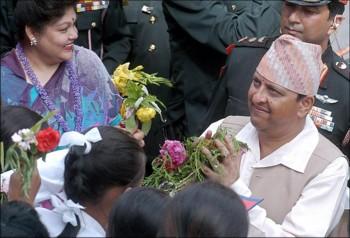In the Katmandu suburb Lalitpur Thursday, King Gyanendra and Queen Komal became Nepal's first royals to walk among the people.
By SOMINI SENGUPTAPublished: September 23, 2005
NEW DELHI, Sept. 22 - With thousands of protesters on the streets of Katmandu in Nepal's version of a Prague spring, the government of King Gyanendra promised this week to hold elections and described its commitment to democracy as "unflinching."
Speaking to the United Nations General Assembly late Wednesday, Nepal's foreign minister, Ramesh Nath Pandey, said local elections could be held next April and national parliamentary elections by April 2008. Although the king has repeatedly said he believes in an elected system of government, Mr. Pandey's comments offered the most specific timetable for elections.
Mr. Pandey said that the king had made a commitment to "re-energize multiparty democratic institutions by restoring sustainable peace and making democracy meaningful, matured, cultured and refined."
King Gyanendra removed the elected Parliament more than two years ago and assumed absolute control over Nepal's affairs in February by declaring emergency rule. At the time, the palace said that he had acted after politicians had failed to crush a Maoist insurgency because they were corrupt and ineffective.
Emergency rule has been lifted, but many restrictions on civil liberties remain, and Nepal, with about 23 million people, continues to be ruled by a hand-picked palace cabinet.
A coalition of seven political parties has been demanding reinstatement of the last elected Parliament. Early this month, the Maoists declared a unilateral cease-fire, though independent news reports suggest that forced recruitment and indoctrination for their forces continue.
Critics questioned the king's promises and how elections could be held. "The present regime has lost control, or does not sufficiently dominate, large areas of the country, and holding a credible election - with adequate security to candidates and poll officials - does not appear likely," said Ajai Sahni, of the Institute for Conflict Management in Delhi. "Dictators and autocrats are constantly trying to buy time for themselves by reassuring the international community that they cling to power only because they wish to restore 'complete democracy' at some constantly deferred moment in the future, even as they continue to undermine and destroy democratic institutions and processes in the present."
King Gyanendra was scheduled to attend the United Nations session but sent his foreign minister instead, as the heads of Nepal's embittered parties sent a stinging letter to the secretary general, Kofi Annan. "The present royal regime and its political representatives have no competence, authority and legitimacy to represent and speak on behalf of the sovereign people of Nepal," it said.
"The lasting peace can only be achieved through dialogue based on trust and confidence," Mr. Pandey told the General Assembly. "But any overture must be credible and sincere enough to dispel all doubts and suspicions surrounding it."
Renewed protests have gone on for two weeks, with hundreds of arrests and the United Nations' human rights agency accusing the police of using excessive force against protesters and torturing prisoners.
Gen. Ashok K. Mehta, a retired Indian Army officer who watches Nepali politics, said Mr. Pandey's comments showed the government had "painted itself in the corner."
Protests by all sections of society "represent the unfortunate struggle between the royal regime and the people of Nepal," General Mehta said by e-mail. "In his bid to grab absolute power, King Gyanendra risks losing all, including the royal dynasty." Sphere: Related Content



No comments:
Post a Comment